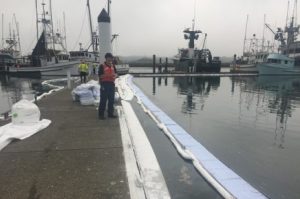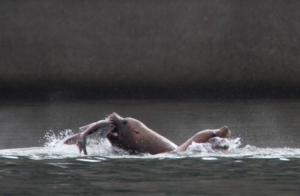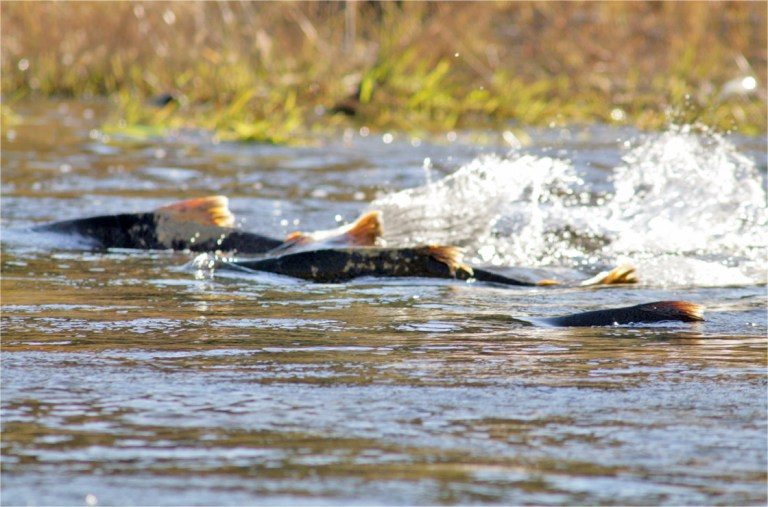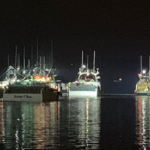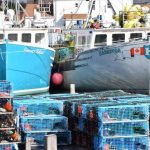Daily Archives: August 19, 2013
F/V Lonestar Not Going Anywhere, For Now
 Magone Marine unable to lift the vessel out of the mud after four attempts, taking the salvage plan back to the drawing board. It’s shaping up to be a quiet week at the mouth of the Igushik River, where salvage operations have thus far failed to lift the F/V Lonestar out of the mud. KDLG’s Dave Bendinger has this update: listen@kdlg 22:12
Magone Marine unable to lift the vessel out of the mud after four attempts, taking the salvage plan back to the drawing board. It’s shaping up to be a quiet week at the mouth of the Igushik River, where salvage operations have thus far failed to lift the F/V Lonestar out of the mud. KDLG’s Dave Bendinger has this update: listen@kdlg 22:12
California – Watch state of salmon forum on webcast; webcast live by the California Channel, www.calchannel.com, video will be archived

SACRAMENTO – Assemblymember Wesley Chesbro, chair of Legislature’s , has finalized the agenda for this week’s special hearing on the state of California salmon. The hearing is scheduled for 1:30 to 4:30 p.m., Wednesday, Aug. 21, in room 437 at the state Capitol in Sacramento. more@mendocinobeacon 21:52
Wild salmon fishery discard video sparks probe

The federal Department of Fisheries and Oceans says it has launched a formal investigation after a video showing allegedly harmful salmon release practices was posted online last week. more@cbcnews 20:15
Jones Boys charged with stealing crab pots in Currituck Co, NC

CURRITUCK CO.–Two brothers face 36 charges after stealing more than 300 crab pots in the Currituck Sound and nearby waters, authorities said Monday. Larry Wayne Jones, 45, and his brother Thomas Eldon Jones, 52, of Barco were arrested Friday. more@wvec 19:59
Government Recklessly Reopened Fisheries in the Gulf – Based Decision on Skewed Data and Questionable Testing Methodology
 Everyone knew something was very wrong back in 2010 when the “US Department of Commerce – National Oceanic and Atmospheric Administration (NOAA) began closing fisheries on May 2, 2010. It began reopening them, with various spatial and other limits, on June 23. The well was capped on July 15.” more@oilandgasleaks 17:26
Everyone knew something was very wrong back in 2010 when the “US Department of Commerce – National Oceanic and Atmospheric Administration (NOAA) began closing fisheries on May 2, 2010. It began reopening them, with various spatial and other limits, on June 23. The well was capped on July 15.” more@oilandgasleaks 17:26
NOAA Inaction in the Gulf of Mexico http://www.fishnet-usa.com/NOAA_Inaction.htm
Pink catches set records; AK 2013 salmon season on track for all time high! This is Fish Radio. I’m Laine Welch
 Alaska’s pink salmon catch by yesterday neared 170 million – blowing past the 161 million record set in 2005 – and millions more humpies are still swarming in. listen@alaskafishradio 17:17
Alaska’s pink salmon catch by yesterday neared 170 million – blowing past the 161 million record set in 2005 – and millions more humpies are still swarming in. listen@alaskafishradio 17:17
One Tough Job…Salmon Set Netters Share Their Summer Challenges – This is Fish Radio. I’m Stephanie Mangini.
 A gill-netter once said… “You can have a really good year and you don’t get rich. Or you can have a really bad year and you don’t go poor.” listen@alaskafishradio 17:13
A gill-netter once said… “You can have a really good year and you don’t get rich. Or you can have a really bad year and you don’t go poor.” listen@alaskafishradio 17:13
Opinion: Feds must do more to protect BC salmon
Skeena River sockeye salmon are returning in desperately low numbers this summer, causing concern among conservationists for the future of one of British Columbia’s largest and most diverse salmon runs. The run collapse triggered closures of commercial and recreational fisheries in B.C., and restricted First Nations’ food fisheries. Meanwhile, commercial fisheries in Alaska intercepted large numbers of Skeena sockeye just over the border, less than 100 kilometres from the mouth of the Skeena River. more@terracestandard 15:52
F/V Jessica Heather, freed from sand at Atlantic City
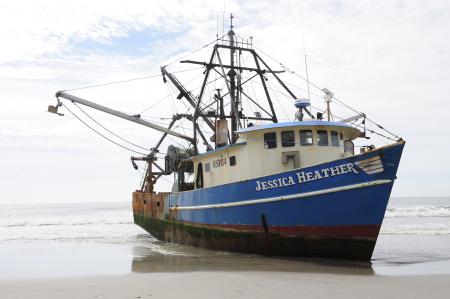 F/V Jessica Heather, homeported in Atlantic City, aground in Atlantic City Coast Guard Marine Environmental Response Personnel are on scene and are working with state and local responders to monitor the situation in order to mitigate any pollution issues that may occur. A local tow company is en-route to re-float the vessel during high tide at approximately 7 p.m. and if successful, will return the fishing vessel safely to its homeport. more@uscgnews 15:11
F/V Jessica Heather, homeported in Atlantic City, aground in Atlantic City Coast Guard Marine Environmental Response Personnel are on scene and are working with state and local responders to monitor the situation in order to mitigate any pollution issues that may occur. A local tow company is en-route to re-float the vessel during high tide at approximately 7 p.m. and if successful, will return the fishing vessel safely to its homeport. more@uscgnews 15:11
F/V Jessica Heather, freed from sand at Atlantic City more@uscgnews video
“Hey, boss … I don’t know if they’re here. It don’t look real promising,” – Three years after BP, Gulf fishermen struggle to survive
 Before, they would have pulled in 20 or so in that time. But that was before. Like many along the coast, fishermen and their families refer to life in a series of befores and afters — before Katrina and after Katrina, before and after Gustav, and before or after the four or five other major storms that have struck in the last eight years. And then came BP. more@facingsouth 14:51
Before, they would have pulled in 20 or so in that time. But that was before. Like many along the coast, fishermen and their families refer to life in a series of befores and afters — before Katrina and after Katrina, before and after Gustav, and before or after the four or five other major storms that have struck in the last eight years. And then came BP. more@facingsouth 14:51
As alewife populations recover, a new economy emerges

Friendship lobsterman Jim Wotton believes the resurgent river herring could feed lobster traps en masse, generating big profits. Wotton, 44, of Friendship, is one of Maine’s authentic lobstermen, but he’s also taken on a second role in recent years that offers a look into the future. As a member of the Alewife Harvesters of Maine, Wotton has staked a claim in an up-and-coming industry that may soon be hugely important to Maine’s 6,000 lobstermen. more@morningsentinal 14:33
Oregon – Brookings, Newport lead Dungeness crab totals – ranks sixth in the last 15 years.

Preliminary numbers show landings in excess of 18.1 million pounds for the season, which officially ended Wednesday. The record, set back in the 2004-05 season, stands at 33.7 million pounds. In the most recent 10-year period, Oregon landings have averaged 20.3 million pounds annually. more@dailyastorian 14:19
Lobster retail pricing has lobstermen at the mercy of a Commodity Market

For more than a decade, we’ve been living through a commodity price boom. From oil to wheat and beef, the general rule has been that if you farmed it, caught it, or took it out of the ground you were probably going to make money selling it. But there has been a strange exception: lobster. In 2005, Maine lobster was selling for almost six dollars a pound wholesale. By 2009, it cost just half that, and, in the past couple of summers, huge lobster harvests, believed by some to be a result of global warming, have glutted the market, sending prices tumbling further. This month, lobster off the boat is selling for as low as $2.20 a pound. more@the newyorker 14:04
CDQs bring millions in fishing profits — and jobs — to poor western Alaska villages

Congress tried to honor that connection when it created the Community Development Quota, or CDQ, program, in 1992. Before CDQs, commercial fishing was dominated by outside interests, most notably from foreign countries and other states, said Clem Tillion, who helped create the program as then-Gov. Wally Hickel’s fisheries guru. The program gave six groups, meant to represent a total of 65 communities along a 50-mile stretch of the Bering Sea coast, an allocation in certain Bering Sea fisheries managed by the federal government. The groups are nonprofit corporations that represent a total 27,000 Alaska residents. Each has a set geographic range in Western Alaska, from Atka to Diomede. more@alaskadispatch 13:51
Water wars: What does Florida have that Georgia needs?
U.S. District Judge Paul Magnuson was writing from the Middle District of Florida. “Too often, state, local, and even national government actors do not consider the long-term consequences of their decisions,” he wrote. “Local governments allow unchecked growth because it increases tax revenue, but these same governments do not sufficiently plan for the resources such unchecked growth will require. “Nor do individual citizens consider frequently enough their consumption of our scarce resources absent a crisis situation …” he wrote. “The problems faced in the (Apalachicola-Chattahoochee-Flint) basin will continue to be repeated throughout this country, as the population grows and more undeveloped land is developed.”more@ledgerinquirer 09:58
Hancock Lobster Co. owner’s seafood empire gaining national notoriety

Owner Cal Hancock arrives with a hearty handshake. “Did you hear what’s going on?” she asks a visitor. “We just got an account with Delta for our lobster mac and cheese,” beams Hancock, whose rich and creamy recipe made with Maine lobster and mascarpone cheese will be served in the airline’s first class cabins this fall. “It’s very exciting.” more@bdn 8:12
Port of Digby bustling with boats in wake of renovations

DIGBY — Digby may be one of the most expensive ports in Nova Scotia when it comes to tying up a fishing boat, but the town’s public wharf is nonetheless expanding in a big way. To date this year, some 83 boats use the wharf as a home port. more@chronicleherald 06:45:46
Oyster rising: Farmers work to propel aquaculture in NC
WILMINGTON — The bays and sounds of North Carolina once yielded hundreds of thousands of bushels of oysters a year, before pollution, overfishing , disease and other factors caused their populations to decline. Now a small group of scientists and growers is laying the groundwork to revive the industry by cultivating oysters in cages and bags. more@newsobserver06:23:59
California’s squid industry is booming – Tons and tons of Market Squid are brought into the harbor every morning.
The abundance is because it’s spawning season. At this time of the year, Market Squid travel in massive schools to spawn and die. The squid industry was volatile for a few years because the state did not want them to be over-fished, so regulations were put in place. Today, there is a limit on how many one boat can catch, and under new regulations, they cannot be fished on the weekends. more@ksby02:11:02




































